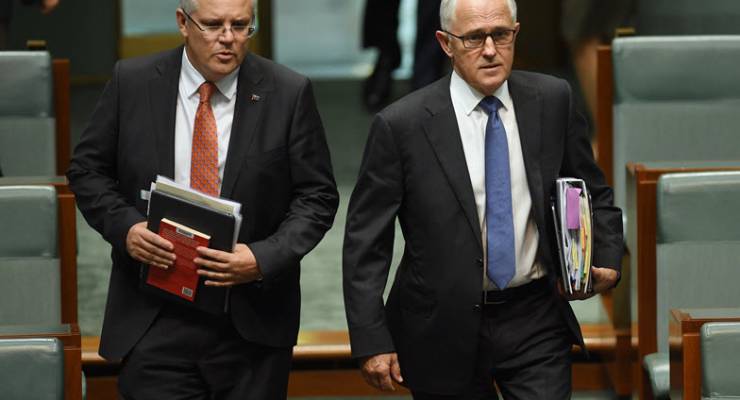
With reports of Prime Minister Malcolm Turnbull taking control of the 2017 budget and rumours that Scott Morrison will be demoted from the senior portfolio in the next ministerial reshuffle, the March news on the economy was disastrous for the Treasurer.
At least seven new records were set. None are to his credit.
Labor’s debt doubled
The Office of Financial Management released figures on Friday showing gross borrowings at $484.6 billion. Of this, $58 billion is residue from the Howard government or its predecessors. Labor increased it by $212 billion. Another $214.6 billion has been added since the 2013 election.
Hence the Coalition has now more than doubled Labor’s gross debt, in three years and six months. It doubled Labor’s net debt in January.
Rate of debt increase
Gross debt added in March was $18.7 billion, the highest monthly increment in Australia’s history. The most Labor treasurer Wayne Swan added was $13.2 billion in May 2009, at the depths of the global financial crisis. Former treasurer Joe Hockey’s highest was $12.7 billion in November 2013.
Nine months into this financial year, the total gross debt added so far has been a staggering $64.2 billion. That’s an extra $7.13 billion each month on average — the highest for the first nine months of any financial year in history.
It belts Hockey’s first nine months in 2013-14, when he added $53.6 billion — the second greatest ever. Labor’s highest was $44.7 billion in 2011-12.
People unemployed
Since the restructure of Australia’s economy in the late 1980s, the jobless number has steadily declined. It dropped below 720,000 in 1998, where it stayed for the next 15 years. Until Joe Hockey.
Within months of the hapless Hockey becoming treasurer, it was back above 720,000 again. Levels have remained high ever since, despite changing prime minister and treasurer. The jobless number has been above 720,000 for 31 of the last 34 months. In February it was 748,123.
Jobs for women
Women’s unemployment is now back above 6%. It has been 5.7% or higher for the last 39 months. The last time that occurred was 2001 to 2004. For most of Labor’s period, including the GFC, female unemployment ranged between 4.6% and 5.6%.
The ratio of full-time to total jobs
This ratio fell in March 2016 to the lowest in history — 68.6%. It tumbled further for the next two months and then fell below 68% for the first time last September. The January number was a new record low of 67.7%. February’s is the third lowest ever at 67.99%.
Ratio of men’s employment to population
This ratio has been at 62.2% for the last two months and for three of the last six. The last time it was this low was in the early 1990s recession.
Underemployment
As Crikey showed last week, the number of workers who need to work more hours has exploded. It clicked over 1 million after Joe Hockey’s first budget and last month reached a new record 1,114,558 workers. That’s up as a percentage of the labour force from 7.8% when the Coalition took office to an all-time high 8.7%.
Youth underemployment
For young people aged 15 to 24, underutilisation is now 31.5%, a new Australian high. This breaks all Joe Hockey’s previous records. The Labor period’s highest was 27.4%, and in the Howard years 27.9%.
Engineering construction
Total engineering construction activity for the year to December 2016, announced by the ABS on Wednesday, showed the worst annual decline ever.
Activity in 2016 fell 19.7% on 2015, which was down 13.0% on the year before. Even 2014 was 9.6% below 2013, which was down 1.7% on 2012. That makes four consecutive annual declines — for the first time. The last three were all the worst on record.
Trade surplus slashed
One positive for the Turnbull government in recent months has been the trade balance, which appeared as a surplus in November for the first time in 32 months. December’s trade surplus was even better at $3.33 billion, a record high.
That was followed, however, by the second worst collapse in Australia’s history. Figures released last month show the January balance is suddenly $2 billion lower at just $1.30 billion.
So, Scott, as the soothsayer said to Julius Caesar: “Beware the ides of March.”








Shocking
Fair go, though, Crikey: what about the things the government actually cares about? How are corporate profits, actual corporate tax takes relative to their expected levels (i.e. those that would occur if the tax schedules actually applied), CEO pay, big end property prices – that sort of thing?
When will the myth of Coalition financial management be buried? They’re consistently lazy and self (and supporter) serving. We can’t afford them in power much longer.
What about household debt which has gone through the roof in the face of negative wages growth. (Does anyone believe the con that is the official CPI)
When will we read about this sort of record of “economic management” in Limited News?
Never ever.
ON Macquarie radio Blot & the Poison Dwarf had the effrontery to bang on about the need to reign in the debt caused by Labor mismanagement.
No brain, no pain, no shame.
AR:
Willing to learn – Please tell:
Who are BLOT and THE POISON DWARF?
Blot, aka Andrew Dolt and his Hobbsean (nasty, brutish & short) mate, Steve “any” Price who indulge in a mutual tongue bath 4 nights pw on the Macquarie network.
If you have the stomach, try catching it 8-9pm.
Yeah they caused the GFC just as surely as Keating caused the 1990s recession. There are mental midgets who actually believe Labor was the cause rather than a victim of the latter
Lucky we are blessed by having the responsible economic managers in power!